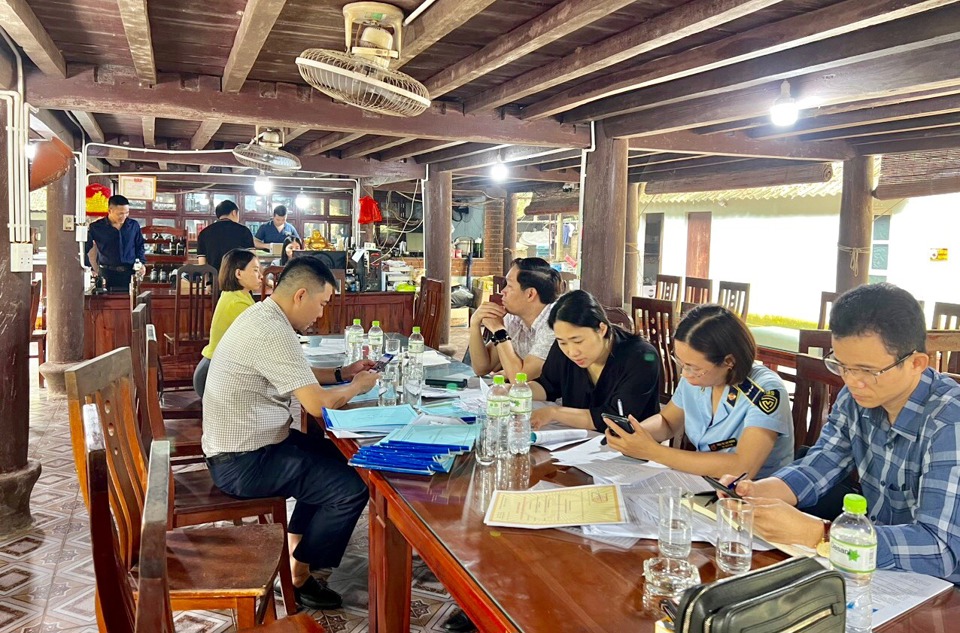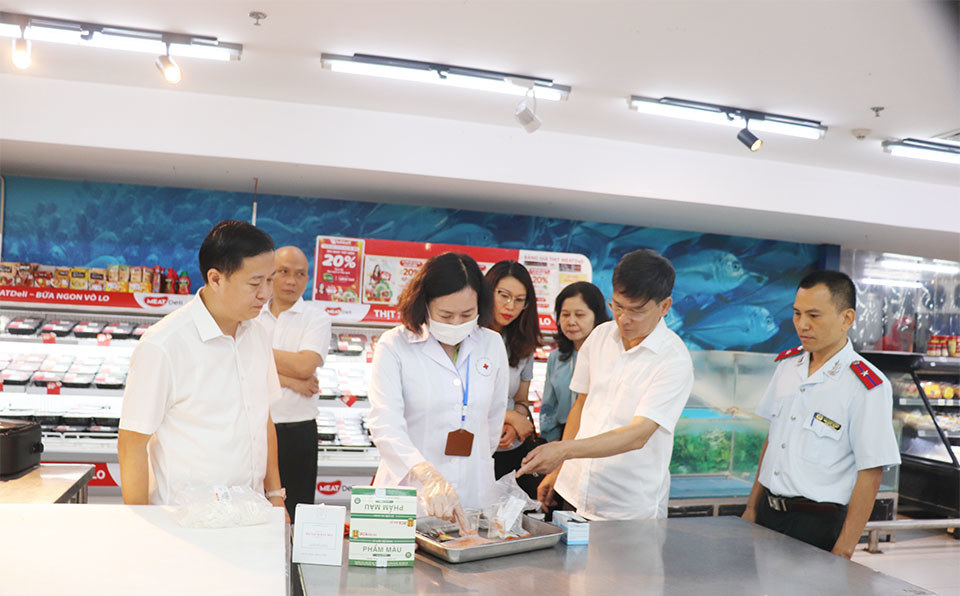Hanoi ramps up food safety inspections, identifying and rectifying violations
The city's health department will continue to carry out regular, specialized and random inspections.
Local authorities in Hanoi have stepped up their post-inspection efforts on food safety. This has resulted in the timely detection of unsafe food and non-compliant businesses, followed by strict enforcement action in accordance with the law.
Local authorities have also provided guidance and support to food production and business establishments to help them address the identified violations.
Quality control at every stage
| The multidisciplinary inspection team from Soc Son District inspected a food service establishment for compliance with food safety regulations. Photos: Tung Nguyen |
According to Hoang Xuan Truong, Head of the Ba Vi District Health Department, since the beginning of 2024, inspection teams from the district and its communes/towns have focused on controlling the quality of food at various stages, including raw material procurement, transportation and storage; production and processing phases; import and market circulation; and the use of food additives, processing aids, flavorings and colorings in food processing.
The authorities have also monitored the use of prohibited substances in livestock, crops and aquaculture, as well as residues of antibiotics, pesticides and veterinary medicines, he added.
He said for small-scale livestock and poultry slaughtering activities, the district has focused on controlling the use of salbutamol and addressing issues such as counterfeit food, products without clear origin, expired goods and smuggled items.
Truong said that local authorities have been monitoring trade and e-commerce activities involving food, focusing on health supplements, fortified foods, and nutritional products.
He added that the district's inter-agency inspection teams have inspected more than 1,300 food production, trade, and service enterprises and have imposed administrative fines totaling VND268 million (US$10,486) on 42 offenders.
Luu Thi Hong Sen, Director of the Soc Son District Health Department, said that from the beginning of the year until now, the cross-functional inspection teams of the district and 26 communes and cities have inspected the implementation of legal regulations on food safety at 365 food production and business facilities to manage food safety.
She added that the teams found that 36 out of 365 establishments had violated food safety regulations. In addition, the 26 communes and cities had seized and destroyed 80 liters of non-compliant liquor, 305 packets of cakes and sweets, 40 kg of chicken drumsticks, and 55 kg of pig hooves of unknown origin, with a total value of about VND14.6 million ($571).
"Currently, food production and business establishments are still violating regulations due to the lack of awareness about food safety among producers and traders. Consumers are also lax in their food choices, creating conditions for unsafe food to circulate in the market," Sen told Hanoimoi Newspaper.
Nguyen Thi Le Quyen of Vat Lai Commune, Ba Vi District, suggested that to ensure consumer health, relevant authorities need to step up inspections and quality control of food in shops, production and processing facilities.
Inadequate food preservation equipment in some shops, especially traditional markets, can easily lead to food spoilage and poisoning during the hot summer months, she added.
According to the Hanoi Department of Health, local authorities must take responsibility for food safety and improve the effectiveness of food safety management by the end of the year.
In addition, local authorities should strengthen inter-agency cooperation to comprehensively implement food safety measures to prevent food poisoning.
Continue regular and special food inspections
| The city's interdisciplinary food safety inspection team at a Hanoi's supermarket. |
Nguyen Thi Bich Ngoc, Vice Chairwoman of the Thach That District People's Committee, said that in the coming period, localities and cities will intensify communication to raise awareness and compliance with food safety laws and regulations among organizations and individuals involved in food production and trade.
She added that local authorities will step up regular and unannounced post-inspection checks on the implementation of food safety regulations and resolutely deal with violations in food production and trade.
Dang Thanh Phong, Director of the Hanoi Department of Food Safety and Hygiene under the Hanoi Department of Health, said the city's health sector will continue regular, specialized and unannounced inspections, conduct post-declaration audits and food sample tests, and deal with violations of food safety standards.
He added that the department will launch projects and pilot models on food safety, including continuing to maintain specialized topics on food services, street food and civilized food safety streets in 30 districts and cities.
In addition, local authorities will strengthen efforts to prevent food poisoning and maintain and improve the capacity of the food poisoning and foodborne illness surveillance system from the city to the grassroots level, Phong told Hanoimoi Newspaper.
He emphasized the need for local authorities to establish a foodborne disease prevention and control command and response team with adequate resources and equipment to investigate and manage incidents of foodborne disease in their jurisdictions.
"Local authorities also need to proactively monitor the quality of food circulating in the market, warn of risks and trace the source of unsafe food," Phong stressed.
Team up to enhance food safety The Hanoi Food Safety and Hygiene Department emphasizes that ensuring food safety requires close collaboration among various agencies and institutions. To enhance food traceability and control the supply of ingredients, the city has actively partnered with neighboring provinces. During the Food Safety Action Month 2024, the city deployed 701 inspection teams to evaluate more than 12,500 establishments. Impressively, more than 10,500 (84.1%) complied with safety regulations, but 1,814 were flagged for violations. According to the Hanoi Department of Health reported that fines exceeding VND8.8 billion (around US$345,986) were imposed on 1,679 non-compliant businesses. Throughout the Food Safety Action Month, the city underscored the vital roles of local governments, regulatory agencies, social organizations, and consumers. By raising awareness among producers and traders about food safety compliance, authorities aimed to ensure swift responses to any incidents. This collective effort highlights Hanoi's commitment to fostering a culture of food safety, ultimately protecting public health and enhancing consumer confidence in the food supply chain. As the city continues to prioritize food safety, community involvement remains crucial for ongoing improvements. |












